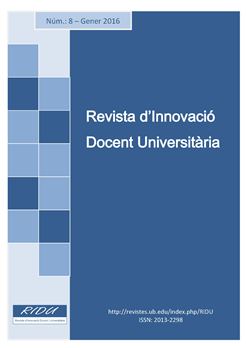Professional Skills of Business Graduates: Assessment of training needs
DOI:
https://doi.org/10.1344/RIDU2016.8.6Keywords:
Professional skills, Educational setting, Business graduates, Labor marketAbstract
The main objectives of this paper are to identify the demand for skills related to professional practice in the field of management and to analyze the mismatch between the graduate skills on offer and the demand from employers. The key element of the work is the opinion of entrepreneurs, attained through a survey and specific interviews.
According to the results, companies value generic skills more than specific skills; competences or individual characteristics have been recognized as significant predictors of employment performance and success. The results The results indicate that it is appropriate to introduce new methods of teaching and learning in the University and suggest the desirability of a deeper relationship between universities and enterprises.
References
[1] Alcañiz, M., Riera, C., Claveria, O. (2013) La formació competencial dels llicenciats en economia i empresa: una visió des del seu entorn professional. Revista d’Innovació i Recerca en Educació, 6(2), pp. 64-85.
[2] Allen, J., Ramaekers, G. (2006) Survey among employers of alumni from the Faculty of Economics and Business Administration of Universiteit Maastricht. Faculty of Economics and Business Administration, Maastricht.
[3] Allen, J., Ramaekers, G., Van der Velden, R. (2003) La medición de las competencias de los titulados superiores. En Vidal, J. (coord) Métodos de análisis de la inserción laboral de los Universitarios. Secretariado de Universidades y Medios Audiovisuales, Universidad de León.
[4] Alonso, L., Fernandez, C., Nyssen, J.M. (2009) El debate sobre las competencias. Una investigación cualitativa en torno a la educación superior y el mercado de trabajo en España. ANECA, Madrid.
[5] Bolívar, A. (2008) El discurso de las competencias en España: Educación básica y educación superior. Revista de Docencia Universitaria REDU, 2, pp. 1-23.
[6] Bridgstock, R. (2009) The graduate attributes we’ve overlooked: enhancing graduate employability through career management skills. Higer Education Research and Development, 28(1), pp. 31-44.
[7] Coromines, E., Saurina, D., Villar, E. (2010) Adequació de la formació universitària al mercat de treball. Anàlisi de tres cohorts de graduats a Catalunya. AQU, Barcelona.
[8] González, J., Wagenaar, R. (ed) (2003) Tuning Educational Structures in Europe. Deusto y Groningen: Universidad de Deusto y Universidad de Groningen.
[9] Hodges, D., Burchell, N. (2003) Business Graduate Competencies: Employers’ Views on Importance and Performance. Asia-Pacific Journal of Cooperative Education, 4(2), pp. 16-22.
[10] Martín-del-Peso, M., Rabadán-Gómez, A., Hernández-March, J. (2013) Desajustes entre formación y empleo en el ámbito de las Enseñanzas Técnicas Universitarias: La visión de los empleadores de la Comunidad de Madrid. Revista de Educación, 360, pp. 244-267.
[11] Marzo-Navarro, M., Pedraja-Iglesias, M., Rivera-Torres, P. (2009) Curricular profile of University graduates versus business demands: Is there a fit or mismatch in Spain? Education and training, 15(1), pp. 56-69.
[12] Nusche, D. (2008) Assessment of learning outcomes in higher education: A comparative review of selected practices. OCDE, Paris. Disponible en: http://oecd.org/dataoecd/13/25/40256023.pdf.
[13] Reio, T.G.J., Sutton, F.C. (2006) Employer Assessment of Work-Related Competencies and Workplace Adaptation. Human Resource Development Quarterly, 17(3), pp. 305-324.
[14] Rothwell, A., Herber, I., Rothwell, F. (2009) Self perceived employability: Construction an initial validation of a scale for university students. Journal of Vocational Behaviour, 75, pp. 152-161.
[15] Teichler, U. (2007) Does Higher Education Matter? Lesson from a Comparative Graduate Survey. Journal of Education, 42(1), pp. 11-34.
Downloads
Published
Issue
Section
License
Authors whishing to publish in this journal agree to the following conditions:
- The author or author retain copyright and grants the journal the right of first publication of the paper.
- The texts will be published under license "Reconocimiento Creative Commons 4.0 España", which allows to share, distribute, reproduce and the public communication of the paper, as long as the name of the author or authors and the journal are clearly stated.







